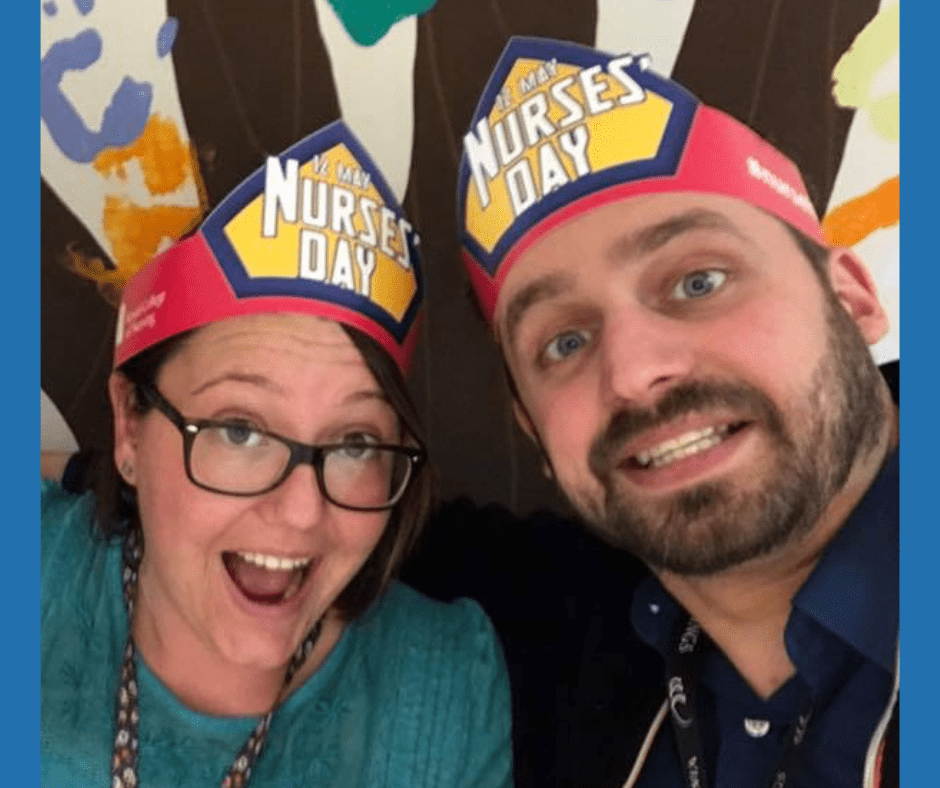On 12 May we will be celebrating International Nurses Day, recognising the incredible work of nurses across the UK.
Edge Hill University lecturer Allen O’Connor is sharing his career journey, why he continues to pick up clinical shifts with Alternative Futures Group (AFG) and his view in how board games can play an important role in supporting people with complex mental health conditions.
Allen is a qualified nurse who lives in Frodsham and has provided 14 years of clinical support to adults living with complex mental needs for Northwest based charity AFG. Allen has recently moved his career and taken up teaching at Edge Hill University in Ormskirk.
How did your career start out?
Allen says: “During my nurse training at the University of Chester I took a work placement at one of AFG’s six independent mental health hospitals at Lea Court in Warrington. I was immediately engaged in the work the team delivered, working alongside people to get them on a journey of recovery. It inspired me and met my values in what I was looking for in a future career.”
Lea Court is a 26-bed hospital providing person-centred support for adults with complex mental health needs. It is led by mental health specialist who work in collaboration with the NHS and other key partners with a focus on rehabilitation and recovery.
Allen continues, “I loved the focus on supporting people to reintegrate them into the community, so I decided to go back to Lea Court for my management placement and then progressed into a range of roles, including working in the therapy team, becoming Senior Nurse Practitioner, and stepping up into the role of Registered Manager of the hospital in 2018.
“AFG supported me to complete my bachelor’s degree and later my master’s degree in Psychosocial Interventions (PSI) for psychosis, along with Higher Education modules in Nursing mentorship and later Professional Nurse Advocacy (PNA). I was also given the opportunity to complete the Preparing to Teach in the Life Long Sector (PTLLS) training, which helped me to develop skills around developing and delivering educational material.”
This gave me an appreciation for the development of staff that later contributed to my decision to work in academia, hence taking the role as lecturer at Edge Hill University.

Allen (pictured right) with colleagues at Lea Court on International Nursing Day
How did you get into academia?
The qualifications and experience that I gained during my time with AFG also provided me with the necessary prerequisites to transition into an academic role.
I was interested in teaching and took the opportunity to do some guest-lecturing at LJMU, Bradford University and the University of Chester. I saw a role come up at Edge Hill University and jumped at the chance to apply, as Edge Hill has an excellent reputation for nurse education in the North-West.
Since starting my new role at the university, I have been enrolled onto a Post-Graduate Certificate in Teaching in Higher Education (PGCTHE) and I have an aspiration to complete a PhD afterwards. Edge Hill University support their staff to complete PhDs and there are plenty of inspirational academics to learn from.
What have been some of your career highlights in mental health nursing?
One of the highlights of my career was getting a service that was making a financial loss back to a position where it was sustainable and profitable, without impacting the excellent level of care delivery being offered.
I was also given the opportunity to contribute towards policy development, decisions around training content and the development of AFG’s nursing and occupational therapy preceptorship programmes.
I’m passionate about modernising services to accommodate trans and non-binary staff and patients. I was able to lead on the policy for transgender patients to ensure the hospitals and services are geared towards people who are not cisgender.
What are your research interests?
Outside of my professional life I have a keen interest in board and card games. I’ve used these in a clinical setting with patients and I’ve seen people open up and engage once they’re involved in some form of play. I would like to explore the use of board and card games as a tool to aid communication and soft-skill development in the psychosis population eventually as a PhD research topic. There currently isn’t anything in the evidence base looking at this topic.
I’m also working with a small team of academics to develop a paper on mental health field content within the current nursing curriculum. I’ve been inspired by the research of many of my new peers and hope to start publishing some of my own writing.
Why do you think it’s important to continue working as a nurse?
It’s great to keep one foot in clinical practice. I’m not ready to stop doing nursing shifts so I have remained on the AFG casual nursing team. I still want to have that face-to-face contact with patients, and I enjoy the energy of a busy shift.
I feel a very strong allegiance to AFG and the team at Lea Court hospital. I love going back for the odd weekend shift and helping where I can. I wouldn’t be the person I am today without the support and development of AFG.
Take all the opportunities you can to engage in training and development. I had so many opportunities to further develop myself as a professional with AFG and for that I will always be grateful. My experience of working for the organisation has been fantastic, I highly recommend it to people starting their professional journey.
And finally, what would your message be on International Nurses Day?
Remember that nursing is not just a job, it’s a role and an important part of your character. We don’t stop being caring, inspirational people when we finish working a shift.
Reflect on the difference we make to people’s lives and be proud that you’re part of such a noble profession.

